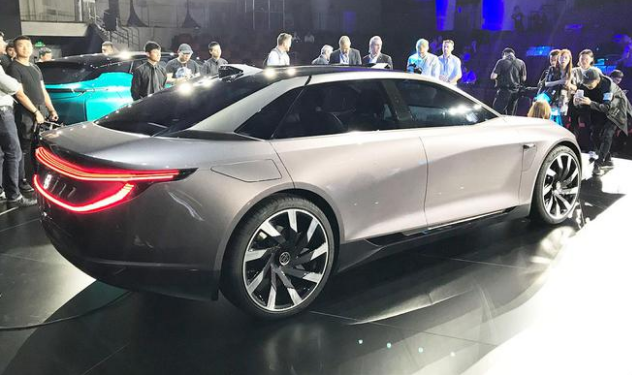Analysts have warned that it is too early to tell which startups are really building their cars, and that the tides will retreat to see who is swimming naked. The number of electric vehicle manufacturers may be reduced as early as 2020. There are several factors that are critical when building a potential Tesla competitor electric car company in China. First, fledgling requires a lot of cash; second, it must receive the firm support of the government; three is essential, must be full of entrepreneurial ambitions. In China, the world's largest auto market, these factors may be met. Electric car startups with unfamiliar names have sprung up everywhere in China. They not only want to sell cars in their backyards, but also hope to make a fortune in the US market and even in Europe. Many companies may be destined to fail to achieve their goals, but even a few successful cases could trigger a major shift in the global automotive industry. In fact, China has become the global Incubator for the next generation of electric vehicles and a strong competitor to Silicon Valley. According to public statistics, the number of new domestic power vehicles has reached more than 20, including Baiteng, Weimar, Weilai, Qidian, Xiaopeng and so on. Although each is little known overseas, each is eager to be the next Tesla. But for most start-up electric car companies, survival (not to mention replacing Tesla) is still impossible. This area has been “overcrowded†and some technologies are still in their infancy. In addition, Tesla's “growth troubles†are also a serious warning to the electric vehicle industry. Tesla is still struggling to cope with mass production and has yet to achieve annual profitability. China is already the largest electric vehicle market in the world. According to data from the China Association of Automobile Manufacturers, China's pure car sales soared 96% in the first half of this year to 313,000. But about 110 electric car manufacturers are chasing this cake, but most new car manufacturers like Baiteng have not sold a car. Many industry observers have warned that the bubble will definitely break. James O'Neill, managing director of JFP Holdings, a consulting bank, said: "Most of the new forces in the car will fail, even though these companies are too busy to believe that electric cars will be the next big event. But they will soon Will reach a point: 'making a car is much more difficult than I thought.'" As a key next-generation technology that must be dominated, the Chinese government has a soft spot for electric vehicles. By 2022, China plans to produce 2 million new energy vehicles a year. These types of vehicles include plug-in hybrids and fuel cell vehicles, but in reality, this mainly refers to battery-powered pure electric vehicles. This top-down policy has made it necessary for traditional manufacturers to produce and sell electric cars, but it has also attracted new players like Bayern. For example, the double-point policy formulated by the Chinese government was officially promulgated on September 28, 2017, stipulating that in 2019 and 2020, the proportion of new energy vehicles will be 10% and 12% respectively. If the points are not up to standard and no negative points are paid, the car companies will face penalties for suspension of declaration of the car catalogue and suspension of production or import of some traditional car models. At the same time, in order to promote the development of the electric vehicle industry, the central government and local governments have all implemented car purchase subsidies, and adopted measures such as unlimited lines and new energy photographs. Michael Dunne, CEO of consulting firm ZoZo Go, said: "With government support, you will continue to wait until the industry is successful and prosperous." "You can no longer call the new forces a new startup for startups because they are too big. I call them emerging automotive technology companies," said Zhou Lei, a partner and automotive analyst at Deloitte. "Chinese investors have already paid attention. From traditional labor-intensive industries to industries with new technological elements that attract China's growing high-end consumer eye." From Tokyo to Detroit to Wolfsburg, the speed, enthusiasm and calmness of China's electric vehicle industry have made some traditional car companies far behind. Toyota China Chairman and General Manager, China Headquarters, China Office General Representative Kazuhiro Kobayashi said at the Beijing Auto Show this year: "The turn of the new energy vehicle is the result of the strengthening of the new energy vehicle policy. China’s motivation to surpass other countries. What impressed me the most is the sense of speed.†On June 25, Evergrande officially announced that it will enter the US new energy auto company Faraday Future for 6.7 billion yuan. On July 31, FF revealed that FF91 had completed the first body-in-white and started the assembly of the car after arriving at the Hanford factory on July 30, local time in Los Angeles. On August 14, Evergrande Faraday will be fully responsible for Faraday's future technology research and development and all production management in China. According to the plan, in the next ten years, Evergrande Faraday will build five R&D and production bases in China's East China, West China, South China, North China and Central China. Ten years later, the company's annual production capacity will reach 5 million units, FF91, FF81 and many more. The series of multi-model products are aimed at the global market, covering high-end, mid-range and entry-level, creating an Internet smart travel ecosystem that fully meets the rapidly growing market needs. This is a microcosm of the development of new electric vehicles in China, which is quite rapid. However, analysts have warned that it is too early to say which startups are really building their cars, and that the tides will retreat to see who is swimming naked. “Some entrepreneurs may really want to do something,†said Yale Zhang, managing director of consulting firm Automotive Foresight. “Even if the company goes bankrupt, the founder can still make a lot of money.†Yale Zhang is one of those who think that the car bubble will burst soon. He said that the number of electric vehicle manufacturers may be reduced as early as 2020, when the Chinese government will begin to cancel its generous electric vehicle subsidies. But those emerging companies will be able to have a lot of young and wealthy users who are eager for new things. People who are optimistic about electric vehicles say that in the world's largest and fastest-growing auto market, as long as they occupy a small market, they can get considerable returns. Oscillator,Crystal Oscillator,Electronic Oscillator,Voltage Controlled Oscillator Zenith Lab (Jiangsu) Co.,Ltd , https://www.zenithlabo.com

Foreign media: Is China's electric vehicle start-up industry a boom or a bubble?
Abstract Analysts have warned that it is too early to tell which startups are really building their cars. It is only after the tide has retreated to see who is swimming naked. The number of electric vehicle manufacturers may be reduced as early as 2020. Establish a potential Tesla competitor in China...